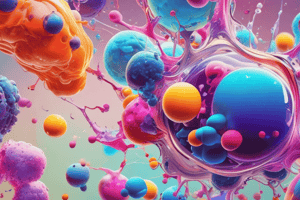Podcast
Questions and Answers
What is Chemistry?
What is Chemistry?
Chemistry is the study of matter and its interactions with other forms of energy.
What is the historical significance of Chemistry?
What is the historical significance of Chemistry?
Chemistry has a long history dating back to ancient times, with modern chemical theory emerging in post-Renaissance Europe.
How has Chemistry advanced over time?
How has Chemistry advanced over time?
Chemistry has advanced significantly, contributing to various aspects of life such as medicine, technology, agriculture, and manufacturing.
What is Organic Chemistry?
What is Organic Chemistry?
Signup and view all the answers
What is Physical Chemistry?
What is Physical Chemistry?
Signup and view all the answers
What are some examples of Chemistry applications in daily life?
What are some examples of Chemistry applications in daily life?
Signup and view all the answers
Study Notes
Science is a field of study that encompasses various disciplines aiming to understand the natural world through observation, experimentation, and analysis. One such discipline within science is Chemistry, which involves studying matter and its interactions with other forms of energy. In essence, chemists explore what things are made out of, how they interact, transform, and change over time. This includes everything from everyday materials like sugar and salt to more complex compounds found in medicines and technological devices.
Chemistry has a long history dating back to ancient times when people observed changes in matter during cooking, fire making, metalworking, and other essential activities. However, it wasn't until post-Renaissance Europe that modern chemical theory began to emerge, including concepts related to atoms and molecules. Today, chemistry has advanced significantly, contributing to numerous aspects of life, including medicine, technology, agriculture, and manufacturing, among others. For example, understanding chemical reactions helps researchers create new pharmaceuticals to treat diseases, develop better ways to produce food, and innovate technologies that improve our daily lives.
Some key areas of chemistry research involve:
- Organic Chemistry: Study of carbon-based compounds and their properties and behavior.
- Physical Chemistry: Focus on the relationships between chemical processes and physical phenomena.
- Analytical Chemistry: Techniques for identifying and quantifying chemicals.
In summary, while science often brings images of starships Enterprise and space travel, a significant portion of scientific work consists of understanding the basic building blocks of all matter - elements like hydrogen and oxygen. Knowledge gained through this type of investigation powers our society today by guiding innovation, providing solutions, improving quality of life, and so much more.
Studying That Suits You
Use AI to generate personalized quizzes and flashcards to suit your learning preferences.
Description
Explore the world of Chemistry, which delves into the composition of matter and its interactions with energy. From everyday materials to complex compounds in medicine and technology, chemists investigate the building blocks of our universe.




